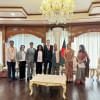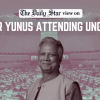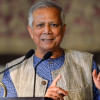The speech by Dr Yunus: A vision for new Bangladesh

The interim government's Chief Adviser Dr Muhammad Yunus's address to the nation on August 25 resonated deeply with the public, striking a chord of authenticity, humility, and aspiration. Social media has been abuzz with comments such as "Dr Yunus's vision for a new Bangladesh gives me hope" and "We needed this kind of leadership years ago." His speech was remarkable not only for what it said, but for how it was delivered—free of arrogance, malice or personal gratification. Instead, it was a call to action, focusing on the urgent need for national unity and the commitment to building a new, democratic, and inclusive Bangladesh.
Dr Yunus emphasised the interim government's dedication to restoring democracy, combating corruption, and overhauling key sectors such as the judiciary, banking, and education. He called on all political parties to support these efforts, urging a consensus-driven approach to rebuild the nation on a foundation that truly serves the public interest. His vision for a new Bangladesh is one where the sacrifices made during the recent uprising translate into a just and democratic society.
A significant part of his speech was his focus on transparency, particularly the declaration of assets by government advisers and the prioritisation of eradicating bribery and rampant corruption. His metaphor of the nation as a family, though powerful, also drew mixed reactions, with some concerned that it might oversimplify the complexities of governance.
While the speech hit the right notes on many fronts, it also left some wanting more. Critics have pointed out that, while Dr Yunus's vision is inspiring, the real challenge lies in its implementation. Comments like, "Talk is cheap—let's see some action," and "Can he really clean up the mess left by 15 years of misrule?" reflect the scepticism that still lingers.
The "country as a family" metaphor, while evocative, may not fully capture the diverse realities and challenges facing the nation. Unity is essential, but it must also respect and embrace diversity. Citizens are not just looking for unity; they want a sense of autonomy and inclusivity within the broader national framework.
Moreover, there was an expectation for Dr Yunus to delve into the specifics of how the interim government would introduce substantive reforms. While procedural changes are necessary, the public is eager to see fundamental structural shifts that address the deep-rooted issues in Bangladesh's governance. Whether this requires constitutional amendments or a complete overhaul was a question left unanswered.
Dr Yunus's humility in admitting the challenges ahead was appreciated. He acknowledged that enacting these changes will not be easy and that mistakes will likely be made along the way. However, he also asked for time and patience, promising transparency and a commitment to course correction as needed. This approach aligns with a broader understanding that nation-building is a complex, adaptive journey.
The interim government's swift leadership change at the home ministry and the formation of an economic panel to draft a white paper are pragmatic steps towards addressing immediate challenges. However, citizens demand more than procedural justice—they seek genuine institutional reforms that will lay the foundation for a new Bangladesh. To build and sustain public trust, the government must prioritise meaningful reforms over superficial actions, avoiding the appearance of arbitrary decisions in recent high-profile arrest cases.
A promising start has been made with the appointment of a student leader as a special assistant to the chief adviser, signalling openness to fresh ideas and perspectives. However, the specifics of the structural changes needed for Bangladesh 2.0 remain unclear. The interim government must continue this dialogue, engaging a broad spectrum of stakeholders to ensure that the reforms are not merely cosmetic, but truly transformative.
This is a crucial moment for Bangladesh. The vision of a new, inclusive, and just society is within reach, but it demands collective effort and a clear path forward. As Dr Yunus aptly said, the journey has just begun. The interim government must now focus on earning the trust and engagement needed to navigate this path.
Citizens aren't looking for quick fixes; they want a sustainable, principled approach that respects the complexity of the task. Using the journey metaphor, building the nation from Tetulia to Teknaf isn't about instant results, but about starting with a strong foundation of principles and pragmatism. It's encouraging to see conversations already underway on how to align people's will with the ideological vision and a strategic thinking for a new Bangladesh—one rooted in autonomy, equity, dignity, and fairness.
Dr Yunus's speech was a strong start, but the real test lies in how the interim government turns this vision into reality. The people of Bangladesh are hopeful and ready to contribute to building Bangladesh 2.0. The road ahead is tough, but with the right actions, it's a journey worth taking. Now, the interim government needs to prove it can deliver on its promises.
Shafiqul Islam is director of Water Diplomacy, professor of civil and environmental engineering and water diplomacy at the Fletcher School of Law and Diplomacy at Tufts University, US.
Views expressed in this article are the author's own.
Follow The Daily Star Opinion on Facebook for the latest opinions, commentaries and analyses by experts and professionals. To contribute your article or letter to The Daily Star Opinion, see our guidelines for submission.

 For all latest news, follow The Daily Star's Google News channel.
For all latest news, follow The Daily Star's Google News channel. 











Comments